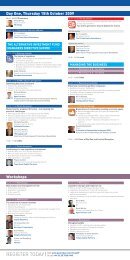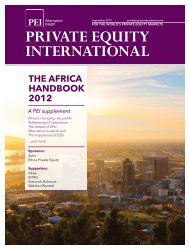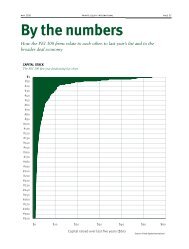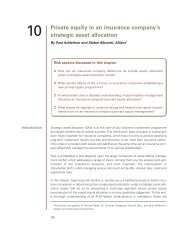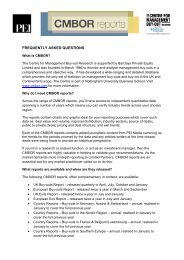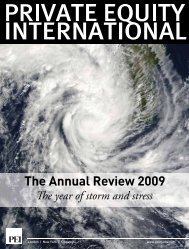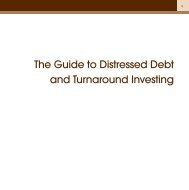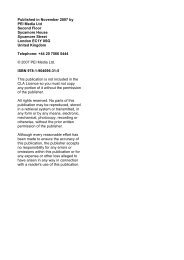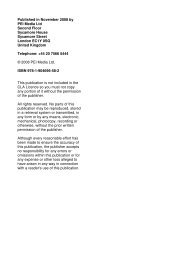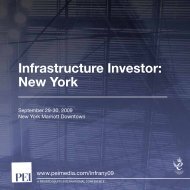THE ANNUAL REVIEW 2010 - PEI Media
THE ANNUAL REVIEW 2010 - PEI Media
THE ANNUAL REVIEW 2010 - PEI Media
Create successful ePaper yourself
Turn your PDF publications into a flip-book with our unique Google optimized e-Paper software.
private equity annual review <strong>2010</strong> pa g e 103<br />
JUNE<br />
What a stable UK government means for<br />
private equity<br />
“With a certain level of clarity over the future<br />
– and £6 billion public spending cuts due this<br />
year – opportunity now knocks for private<br />
equity firms. Firstly, the need to find efficiencies<br />
across the public sector opens the<br />
door for any portfolio companies that offer<br />
products and services that can help with this<br />
task. Secondly – and more pertinently – is the buying opportunity.<br />
As part of a Herculean revenue raising exercise it faces, many<br />
expect the government to size up some of its trading entities and<br />
ask which can realistically be sold off. Assets such as the Tote, a<br />
sports gambling group currently owned by the government, and<br />
Northern Rock, the banking group which was nationalised in 2007,<br />
would certainly be on the block.”<br />
JULY/AUGUST<br />
Solvency II and Basel III threaten the industry<br />
“The draft Solvency II Directive – scheduled to be introduced in<br />
2012 – would create a more stringent capital adequacy regime for<br />
insurers and reinsurers, with the goal of preventing these institutions<br />
from taking on overly “risky” investments. The directive calls<br />
for higher capital adequacy requirements, leading to higher capital<br />
charges against unlisted assets. Criticisms at this stage centre on<br />
the fact that all unlisted holdings are treated as being equally risky,<br />
when in fact risk profiles vary between asset classes (hedge vs.<br />
private equity) and strategies (buyout vs. venture capital). At the<br />
same time the Basel Committee on Banking Supervision is due to<br />
vote later this year on new capital adequacy proposals – dubbed<br />
“Basel III” – which would enforce similarly stringent capital adequacy<br />
requirements on the banking sector. Any noise around the effects<br />
of these two regimes has been drowned out by the rumbling juggernaut<br />
that is the AIFM directive.”<br />
SEPTEMBER<br />
Team up with a French sovereign wealth fund<br />
“The raison d’être of the FSI is clear: sovereign ownership of strategic<br />
assets, keeping French business French. As covered in this<br />
magazine previously, GPs on the ground in France consider the<br />
FSI to be an aggressive competitor in chasing deals. Last year it<br />
invested €800 million in 21 businesses of various sizes. The pairing<br />
with Apollo is, therefore, a curious one. Apollo also has very clear<br />
goals, but they all relate in some way to generating a return for<br />
investors, not protecting French industry. While the two entities<br />
are currently aligned in their aim to own Alcan, this situation could<br />
conceivably change. What if Alcan had to be restructured and jobs<br />
needed to be shed? What if it made fiduciary sense to locate certain<br />
business divisions outside France? It is doubtful that such measures<br />
would sit well with both sides of the partnership.”<br />
“The clock is ticking<br />
on funds’ investment<br />
periods, and money<br />
needs to get into<br />
the ground”<br />
OCTOBER<br />
On remunerating the ailing Candover<br />
team<br />
“Some LPs – and many public shareholders<br />
of Candover Investments – will be left with<br />
a sour taste in their mouths. If this is the<br />
team that got the funds into a hole, why<br />
should they be retained at all? Why should<br />
they be enriched, when investors’ capital has<br />
been eroded? Surely the assets could – and<br />
should – be transferred to a new manager with a more motivated<br />
and resourced team? But as one, more sanguine, Candover LP put<br />
it to <strong>PEI</strong>, any actions taken were designed to protect the interests of<br />
investors. To extract the value of what is left of LPs’ investments, the<br />
team needs to be both retained and motivated. These are the people,<br />
after all, who know the portfolio best.”<br />
NOVEMBER<br />
On a possible rise in the number of take-privates<br />
“The public markets have remained a marginal hunting ground for<br />
private equity firms. But will a new set of circumstances change all<br />
this? With funds ticking towards the end of their investment periods<br />
after what has been a relatively barren two years, private equity<br />
capital is more willing (let’s not say desperate) than ever to find<br />
opportunities. In secondary buyout deals, these willing buyers are<br />
finding equally willing sellers, but only the highest quality assets are<br />
finding their way onto the block and are often the subject of fiercely<br />
competitive – and hence expensive – auctions. Meanwhile, public<br />
stock markets have rebounded. With share prices looking less “bargain<br />
basement”, institutions may well be happier to entertain offers.<br />
If the same institutions fear a ‘double-dip’ recession threatens the<br />
share price in the short term, they may be even happier to cash out.”<br />
DECEMBER/JANUARY<br />
On 5 November: Guy Fawkes night<br />
“It was not Guy Fawkes but another Guy, Terra Firma’s founder,<br />
chief investment officer and figurehead Guy Hands, who occupied<br />
the headlines on 5 November this year. After just four hours<br />
of deliberation, a jury ruled that Citi investment banker David<br />
Wormsley had not tricked his long-time business associate and<br />
sometime friend Guy Hands into overpaying for music group EMI.<br />
At stake was a maximum payout of £1.5 billion (€1.7 billion; $2.4<br />
billion) in damages and considerable reputational risk. A win for<br />
Hands might have set an interesting precedent for other bankers<br />
to be sued where LBOs had gone awry. The ultimate verdict was<br />
unsurprising. Jurors were being asked by Terra Firma’s attorney to<br />
award against Citi purely on the basis of Hands’ testimony: nothing<br />
was offered in the way of documentary evidence. It always seemed<br />
like a long-shot at best or – at worst – a hopeless case for Terra<br />
Firma; a tactic to gain some bargaining leverage in debt renegotiations<br />
that went too far.” n



